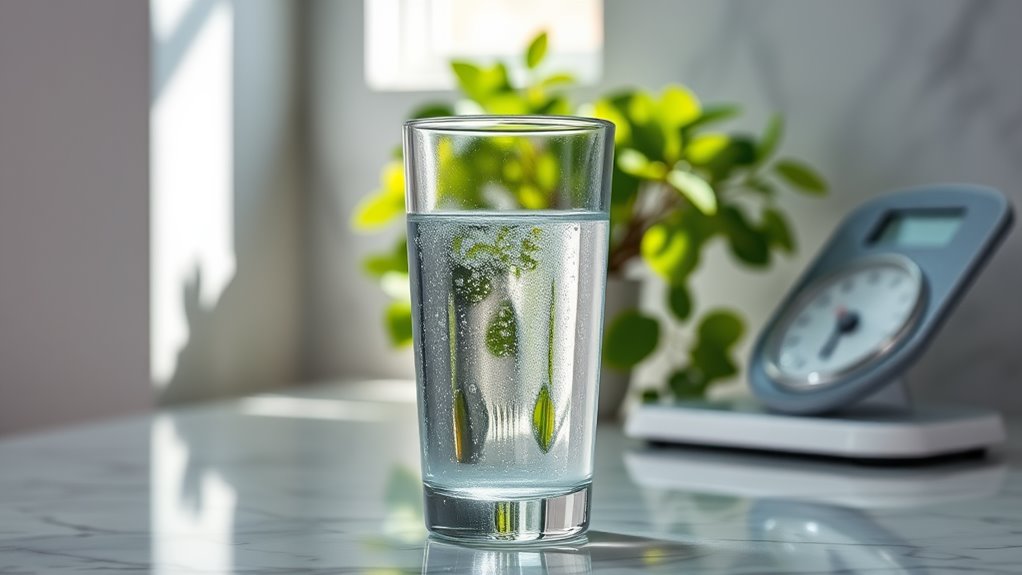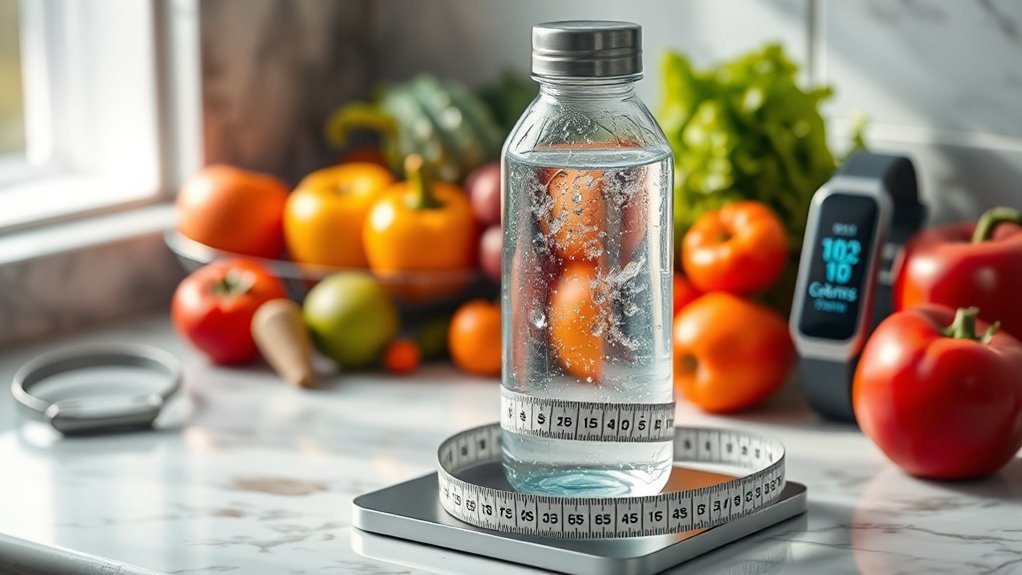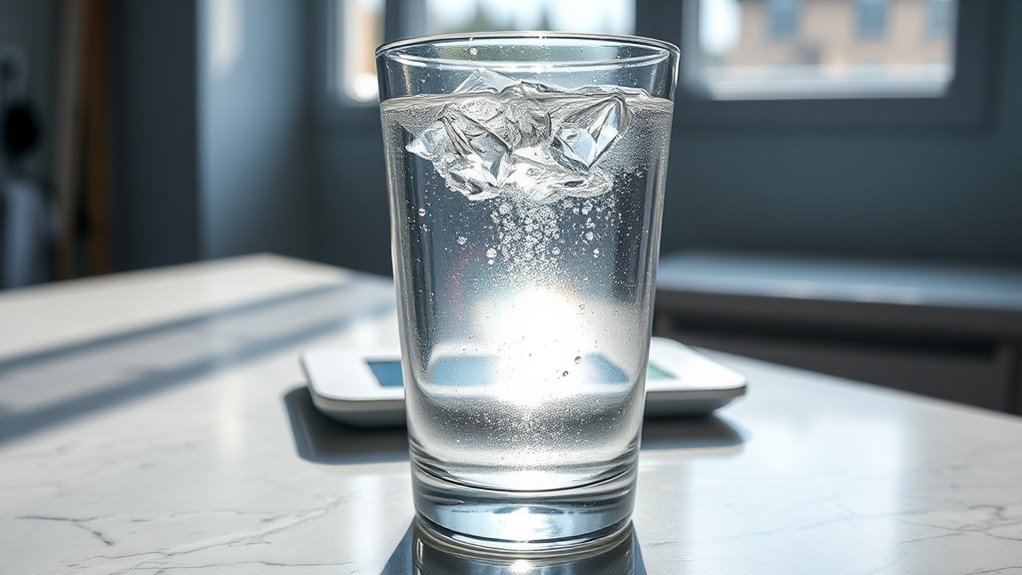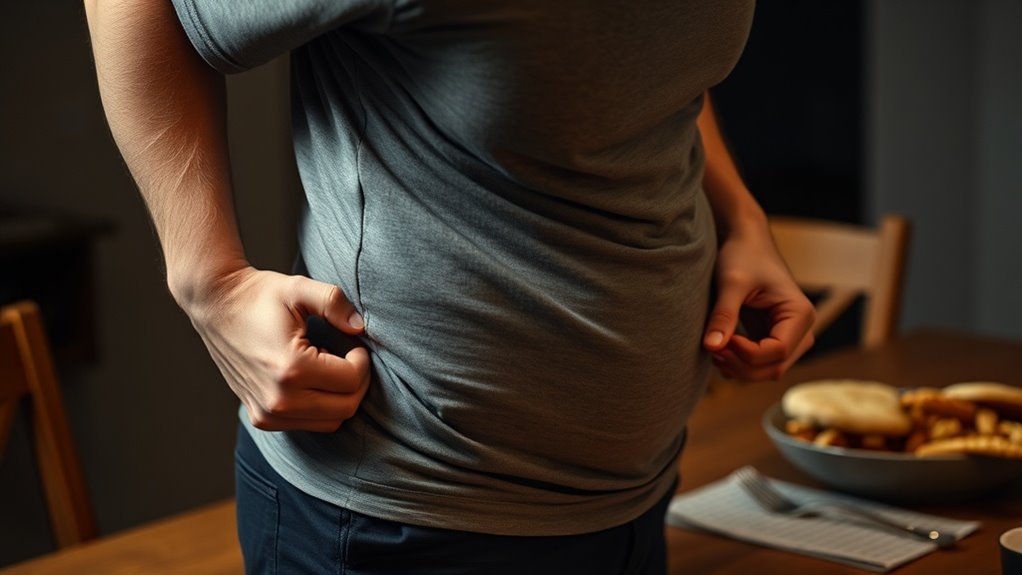Water and Weight Loss- Why Hydration Really Matters
Hydration is vital for weight loss because it boosts your metabolism, curbs appetite, and enhances exercise performance. Drinking water can increase your caloric burn and help create a sense of fullness, reducing calorie intake. Staying well-hydrated improves endurance and supports muscle function, allowing you to work out more efficiently. If you want to optimize your weight management efforts and learn practical hydration tips, keep exploring the powerful connection between water and weight loss.
The Science Behind Hydration and Weight Loss
How does staying hydrated influence your weight loss journey?
Proper hydration plays a crucial role in fat burning.
When you’re well-hydrated, your body efficiently metabolizes stored fat for energy.
Studies show that drinking water before meals can reduce appetite, helping you consume fewer calories.
Additionally, hydration supports your workouts, allowing for better performance and increased calorie burn.
Dehydration, on the other hand, can slow down your metabolism and hinder your weight loss efforts. Increased water intake can lead to feeling fuller and ultimately support your weight loss goals.
How Water Affects Metabolism
Water plays a crucial role in boosting your metabolism and increasing caloric burn. Staying properly hydrated helps maintain your energy levels, making it easier to stay active throughout the day. Additionally, hydration boosts metabolism, aiding in weight loss efforts.
Water and Caloric Burn
Have you ever wondered why staying hydrated is often linked to effective weight loss?
The answer lies in how water influences caloric burn.
Research shows that drinking water can temporarily boost your metabolism by about 30%.
This increase helps you burn more calories, even at rest.
Additionally, consuming cold water requires your body to expend energy to heat it up, further enhancing caloric expenditure.
By replacing high-calorie beverages with water, you not only reduce your overall caloric intake but also promote fat loss.
Hydration and Energy Levels
Why does staying hydrated play such a crucial role in maintaining your energy levels?
Water is essential for optimal metabolic function. When you’re even mildly dehydrated, your body struggles to produce energy efficiently, leading to fatigue.
Research shows that adequate hydration can enhance your physical performance and cognitive function, helping you stay alert and focused.
Additionally, water aids in digestion and nutrient absorption, ensuring your body gets the fuel it needs.
By drinking enough water, you support your metabolism and overall energy levels, allowing you to tackle daily challenges with vigor.
Don’t underestimate the power of hydration in your weight loss journey!
The Role of Water in Appetite Control
Staying hydrated can significantly influence your hunger cues and help you manage your appetite. Drinking water before meals not only fills you up but can also lead to reduced calorie intake. Additionally, proper hydration supports efficient fat burning and overall well-being.
Hydration and Hunger Cues
How often do you find yourself confusing thirst for hunger?
This common mistake can sabotage your weight loss efforts.
Staying hydrated can help you manage appetite more effectively.
Here’s how water plays a role in controlling hunger cues:
- Fills your stomach: Drinking water can create a sensation of fullness, reducing the urge to eat.
- Regulates hormones: Adequate hydration supports the balance of hormones like ghrelin and leptin, which signal hunger and satiety.
- Boosts metabolism: Proper hydration aids in metabolic processes, helping you burn calories efficiently.
Water Before Meals
Drinking water before meals can be a simple yet powerful strategy for managing your appetite.
Research shows that consuming about 500 ml of water before eating can lead to a significant reduction in calorie intake.
This occurs because water fills your stomach, triggering sensations of fullness and reducing the urge to overeat.
Additionally, staying hydrated helps your body function optimally, which can prevent false hunger cues caused by dehydration.
By incorporating this habit into your routine, you can support your weight loss goals effectively.
Hydration and Exercise Performance
What impact does proper hydration have on your exercise performance?
Staying hydrated is crucial for maximizing your physical capabilities.
Here are three key benefits of optimal hydration during exercise:
-
Improved Endurance: Adequate fluid intake helps maintain blood volume, ensuring your muscles receive enough oxygen and nutrients.
-
Enhanced Strength: Hydration supports muscle function and reduces the risk of cramps, allowing you to lift heavier and perform better.
-
Faster Recovery: Proper hydration aids in nutrient transport and waste removal, speeding up recovery time post-exercise. Additionally, being well-hydrated can help you resist unhealthy snack temptations, contributing to better overall fat-burning goals.
Tips for Staying Hydrated Throughout the Day
While staying hydrated might seem straightforward, many people struggle to drink enough water throughout the day. To help you maintain optimal hydration, consider these practical tips:
| Time of Day | Activity | Water Intake Suggestion |
|---|---|---|
| Morning | Upon waking | 1 glass |
| Mid-morning | Snack time | 1 glass |
| Lunch | Meal time | 1-2 glasses |
| Afternoon | Break time | 1 glass |
| Evening | Dinner | 1-2 glasses |
Additionally, keeping hydrated can help prevent mild dehydration which may significantly affect energy and mood throughout your day.
Common Myths About Water and Weight Loss
Many people believe that simply increasing their water intake will lead to significant weight loss, but this is a misconception.
While hydration is crucial, it doesn’t directly burn fat.
Here are three common myths debunked:
- Drinking water burns calories: While water can enhance metabolism slightly, it doesn’t replace the need for a calorie deficit.
- Water suppresses appetite: Staying hydrated may help curb hunger pangs, but it won’t magically eliminate cravings.
- More water equals more weight loss: Overhydration can lead to water retention, counteracting your goals.
Focus on balanced nutrition and exercise alongside proper hydration for effective weight management. Additionally, understanding how water weight vs fat loss can aid in recognizing genuine progress in your weight loss journey is essential.





